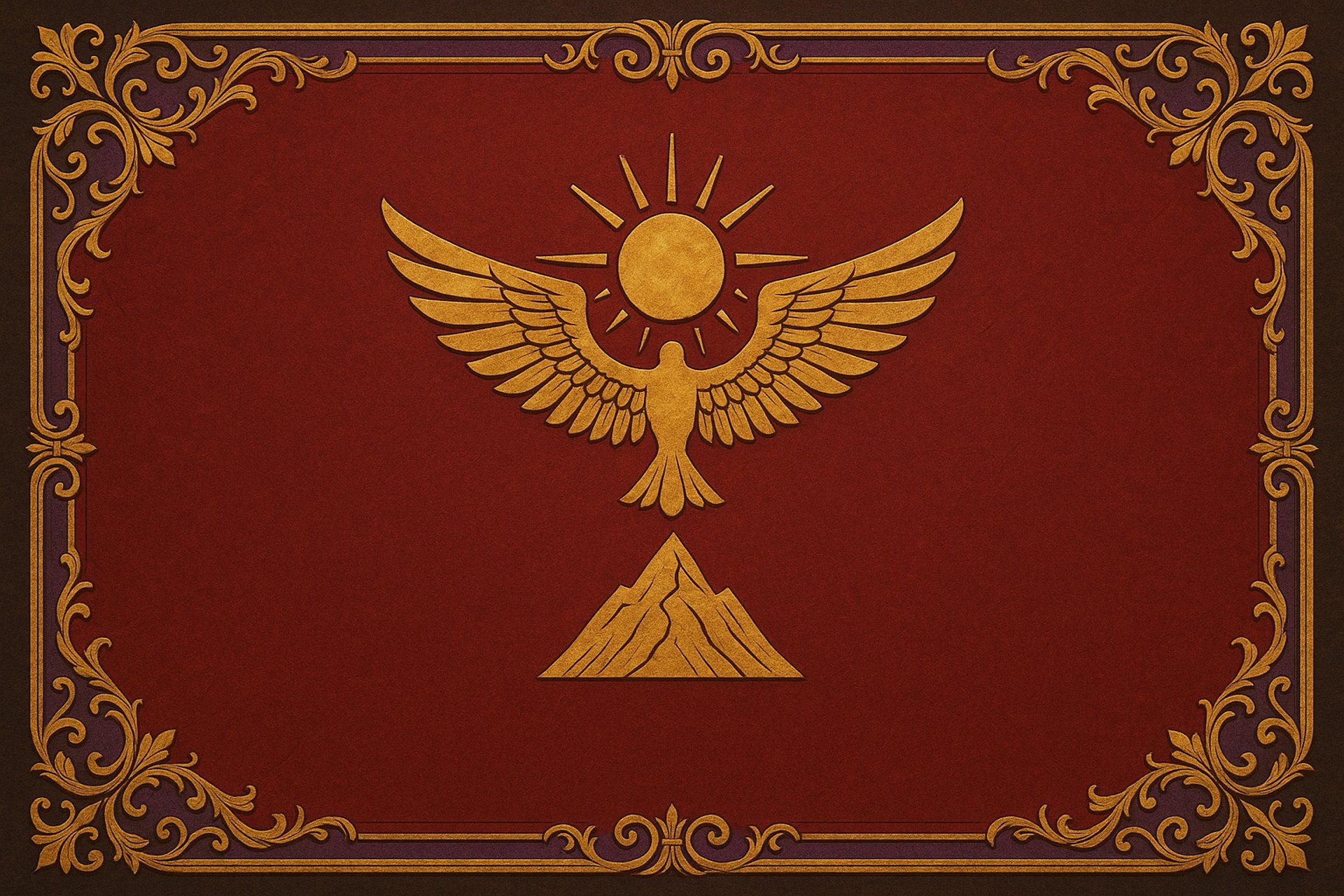
Gomatian Pantheon

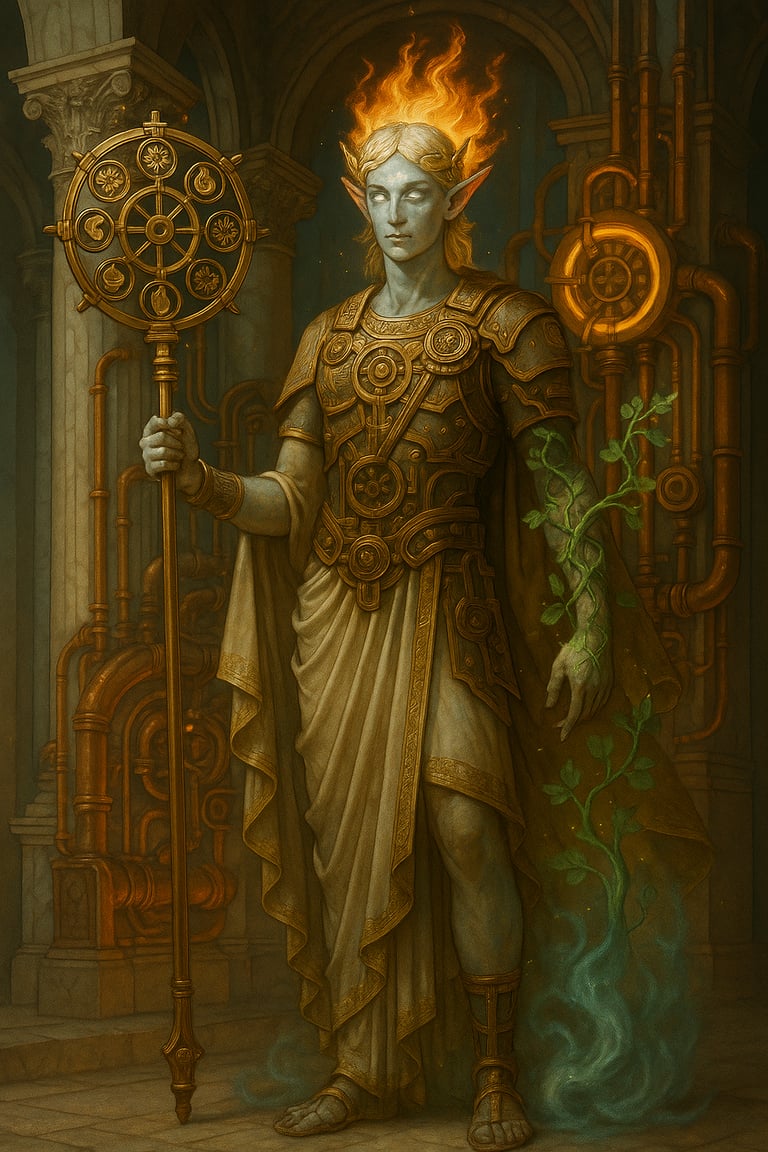

Thalorion
Thalorion, the Supreme Deity of Caelithar, is a being of incomprehensible majesty, revered across cultures as the embodiment of all eight elements in perfect equilibrium. They are known by many titles—the First Flame, the All-Breath, the Root Below—each a reflection of their boundless domain. As the origin of existence, Thalorion is neither god nor mortal, neither male nor female, but something beyond both: a radiant, shifting entity whose form defies permanence. Their hair flickers with living flame, their eyes glimmer like the oldest starlight, and their cloak flows with an ever-shifting pattern of stone, water, wind, and shadow, ever in motion, never in conflict.
In the beginning, there was only Thalorion. From the void, they breathed the elements into being—not as mere forces, but as sacred truths, each with its own soul. Fire, Water, Air, Earth, Nature, Life, Chaos, and Soul emerged from their essence in a moment of divine exhalation. From this breath came form, from form came time, and from time, the world of Caelithar unfurled.
Yet even a god may know solitude. In the silence that followed creation, Thalorion divided themselves further, birthing two twin gods: radiant children of paradox, each embodying complementary truths. One stood for luminous certainty; the other, for elusive mystery. Later, moved by compassion and curiosity, Thalorion descended to the mortal world and took a lover—a brief, brilliant union that brought forth a third god-child, tethered forever between divinity and mortality.
As Caelithar matured, so too did its divine and mortal inhabitants. The elemental gods grew willful and vast, and the mortal races rose to harness the sacred stones that pulsed with their creators’ power. But harmony was not eternal. The Cataclysm—a shattering of the elemental balance—unleashed devastation across the realms. Whether it was kindled by mortal greed, divine pride, or some unknowable truth, none can say. What is known is that in the aftermath of the Cataclysm, Thalorion ceased to walk among mortals. Though the gods remain active—answering prayers, granting visions, shaping the tides of fate—they no longer take physical form in the world of Caelithar. Their withdrawal marked the end of an age when gods stood beside heroes and reshaped mountains with a gesture. Now, they act from afar, their will carried by signs, omens, and the elemental stones they once breathed into being.
Thalorion’s presence, though unseen, is undeniable. The Grand Temple of Thalorion in Gomantia—a monumental structure of marble, brass, and living flame—draws thousands of pilgrims each day. There, the faithful gather beneath the eightfold sigil, offering prayers not of worship, but of reverence and balance. Priests of Thalorion serve not as war-leaders or political mouthpieces, but as keepers of elemental harmony, interpreters of divine law, and mediators among both mortals and gods.
Beyond Gomantia, remote temples endure in wild and sacred places—where elemental boundaries blur and the veil between realms thins. These sites, carved into volcanic cliffs, floating above windswept peaks, or nestled in ancient groves where water flows upward, are rarely visited... yet rumors persist. Travelers whisper of visions in the mist, of a cloaked figure made of starlight and storm stepping silently between the trees. Some claim to have seen Thalorion themself—if only for a heartbeat.
These rumors have ignited a resurgence of pilgrimages to the forgotten corners of Caelithar. Some seek answers, others redemption. A few hope to gaze upon the god whose breath still echoes in every stone and flame. Whether these apparitions are divine truth or desperate delusion remains uncertain, but one thing is clear: Thalorion is not gone. Thalorion’s symbol, a ring of eight interwoven elemental sigils, represents not only the primal forces but also the delicate harmony they must maintain. Though distant, the Supreme Deity’s will is not forgotten. They are watching, waiting... and perhaps, choosing.

Aerion
God of Air and Travel
Anathriel
Goddess of Souls and the Afterlife
Aqualis
Goddess of Water and Healing
Doilfa
Goddess of Mysticism and Chaos
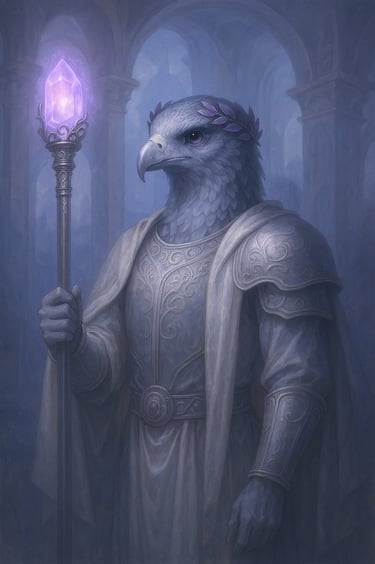

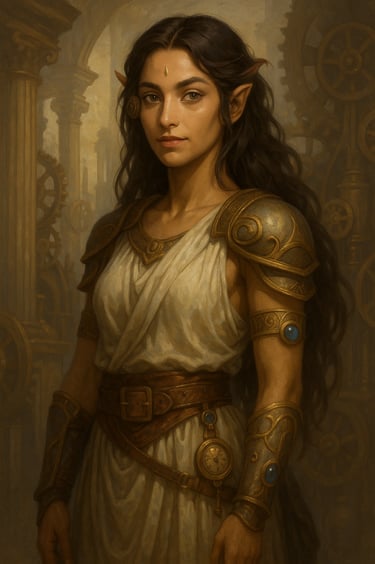

Aerion, the god of Air and Travel, is the ever-shifting wind that dances through the world—elusive, clever, and impossible to contain. Known as the Whisper on the Peaks and the Windswept Rogue, he governs over wind, thought, freedom, and voyages of both body and mind. Wherever movement stirs—be it a breeze, a breath, or a spark of sudden inspiration—Aerion is said to be near.
He is often depicted wearing a winged helm and wielding a staff shrouded in mist, his cloak billowing as if caught in an unseen gale. His laughter is the thunderclap before a clear sky; his insight, the sharp gust that changes a traveler’s course at just the right moment. Of all the elemental gods, Aerion is the most mercurial, quick to vanish and quicker still to speak truths cloaked in riddles.
A popular legend tells of the time Aerion stole sacred knowledge from his divine kin. As the story goes, he slipped unseen through the Vault of Voices—a realm where the gods kept their most potent truths—and unraveled the secrets of flame, stone, and soul. Rather than hoard what he learned, he scattered these mysteries across the skies in wind-whispers, so that only the curious and the brave might hear them.
Aerion’s followers are an eclectic lot: skyfarers, inventors, messengers, spies, and thinkers who thrive in uncertainty. They wear feathers in their hair or etch wind-symbols onto their tools and maps, always listening for a whisper on the breeze. For in Aerion’s faith, it is said:
“The straight path is never the surest, but the wind knows the way.”
Prayer to Aerion, God of Wind and Travel
Aerion, Winged Wanderer,
Bearer of secrets and skyward dreams,
Send your wind to guide our steps,
Swift and sure, clever and free.
Let no chain hold our thoughts,
Let no fear stall our voyage.
Whisper wisdom through the turning gust, And carry us on paths yet unknown.
By air and mind, we move.
By freedom, we become.
This is commonly recited before a journey—by skyfarers before takeoff, by spies before a mission, or even scholars beginning a bold line of thought.
Anathriel, goddess of Soul, walks the quiet road between life and death. Born of Thalorion’s breath and mystery, she was once a lesser light in the celestial chorus—a gentle presence, distant from mortal affairs. But when Anam, the original god of Soul, fell during the Cataclysm, it was Anathriel who stepped forward to bear the mantle he left behind. She did not seize it. She answered it.
In the years since, Anathriel has become a figure of both comfort and awe. Where Anam guided souls with warmth and certainty, Anathriel moves with solemn grace, her presence like the hush before a final breath. She wears a cloak of woven starlight and shadow, and her eyes reflect memories not yet lived. It is said that she speaks little, but when she does, her words echo across lifetimes.
Her symbol is the split mask—one half serene, the other sorrowful—representing both the peace of passing and the pain of parting. She governs not only death, but memory, legacy, and the fragile thread of identity that lingers beyond the grave.
Legends tell of Anathriel walking unseen through battlefields, gathering souls with a touch and whisper. In one tale, she faced a grief-maddened necromancer who refused to release the dead. Rather than strike him down, she opened a portal to the Beyond and let him see the peace he had denied his kin. He wept—and the dead followed her willingly.
Her followers include funeral keepers, spirit-weavers, dreamwalkers, and those who tend memory. Shrines to her are built of pale stone and lit with quiet, colorless flame. Her priests do not promise salvation, only passage.
To call upon Anathriel is not to ask for rescue—but for remembrance, and the strength to let go.
Prayer to Anathriel, Goddess of Souls
Anathriel, Keeper of the Last Light,
Guide this soul with your quiet hand.
Let memory fall gently like snow,
And sorrow pass like wind on still water.
By your gaze, let what was be known.
By your voice, let what must be accepted.
Open the gate beyond the veil,
And carry us onward, unbroken, unseen.
In peace, we return. In soul, we remain.
This prayer is often spoken at funerals, whispered beside the dying, or etched into memorial stones.
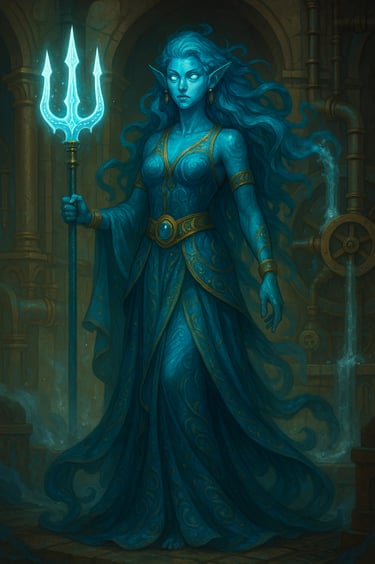

Where water flows, Aqualis is near. She is the goddess of rivers and renewal, of gentle rains, deep springs, and the healing embrace of time. Her mercy is quiet but constant—wearing down grief like stone under stream, mending what is broken not with force, but with unwavering care.
Aqualis appears as a serene, luminous woman wrapped in flowing silks, her hair like liquid silver and her voice the hush of rain on leaves. Flowers bloom where she walks, and her presence soothes the heart like cool water on fevered skin. She governs not only bodily healing, but emotional restoration, forgiveness, and stillness.
One of the oldest legends tells of her bond with Elaren, an elven healer with whom she shared over a thousand years of friendship. As close as sisters, mortal and divine, they wandered the glades of Caelithar together, healing the sick and tending to forgotten springs. When Elaren's time came, Aqualis did not fight death—she held her friend in silence and buried her at the heart of an untouched valley.
From that grave rose a giant silverleaf tree, unlike any seen before. Around it bloomed a glade veiled in perpetual mist and birdsong. It is said that mortals who step into that sacred place feel all grief leave them, replaced by a deep, soul-resting peace. None who enter it return unchanged.
Her followers include healers, midwives, and keepers of sacred springs, who often carry vessels of blessed water or wear her sigil: a teardrop encircling a lotus. Her shrines are peaceful, often hidden, and visited by those who seek to be made whole—not only in body, but in heart.
Prayer to Aqualis, Goddess of Healing
Aqualis, Still Waters,
Bearer of mercy, keeper of tears,
Let your touch mend flesh and soothe sorrow.
Flow through wounds we cannot see,
And through hearts we dare not show.
Where pain clings, wash it clean.
Where memory haunts, bring peace.
By your water, we remember without grief, And live again without fear.
Let your stream carry us gently home.
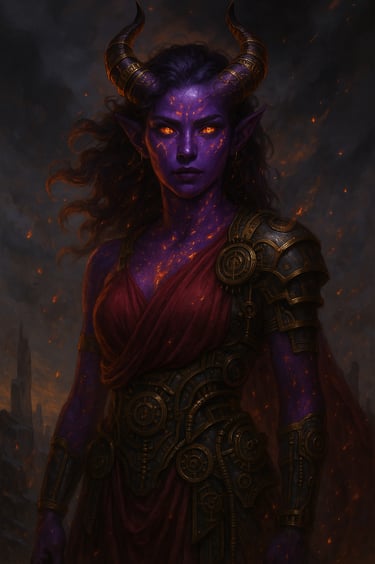

Doilfa is the whisper in the labyrinth, the flicker in the corner of vision, the truth wrapped in riddles. She is the goddess of mystical forces and beautiful chaos—neither benevolent nor cruel, but utterly unpredictable. Her power coils through the world like smoke through keyholes: shaping fate, unraveling order, and revealing hidden truths at terrible cost.
Often depicted as a masked woman draped in silks that shift like smoke, Doilfa’s form changes from tale to tale. Sometimes she is a child with glowing eyes; sometimes an old crone laughing at the stars. She dances on the edge of understanding, tempting mortals with magic beyond comprehension and rewarding them with insight—or ruin.
Her followers include sorcerers, seers, oracles, and outcasts—those who walk the boundaries of knowledge and madness. Her temples are often hidden or moving, filled with enchanted mazes, illusion-guarded doors, and puzzles that defy reason. She is invoked not for safety, but for revelation.
A Legend of Doilfa - There once was a wizard named Vellomar, as his knowledge grew, so too did his obsession with that which could not be ordered. One truth eluded him: the secret of chaos, whispered to be held by Doilfa, the Veiled Flame. He devoted decades to her pursuit, wandering windswept deserts and lost libraries, unraveling paradoxes and solving riddles that bled ink and blood alike. His only companion was a clumsy apprentice named Tren, whose spells misfired more often than not, and whose questions often earned him Vellomar’s ire.
Eventually, the wizard heard of a mountain whose peak brushed the edge of the divine. “There,” he thought, “I shall meet her. There, I shall be granted the truth.” He and Tren climbed for days into thin air, through freezing wind and dizzying heights, until a landslide blocked their path and buried them in a hollow cave. With no food, no water, and no way back, Vellomar watched death approach, his magic spent.
In the final hour, he screamed into the dark, his voice echoing off stone. Doilfa! Why do you not share the secret of chaos with me? I have devoted my life to you!” There was silence. And then, Tren spoke.
“Because you never asked me.”
The apprentice vanished in a shimmer of smoke and Vellomar died alone.
The story is retold by Doilfa’s followers as both a warning and a joke—for in her domain, truth is never where you expect it, and the answers you seek may be asking questions of you.
Prayer to Doilfa, Goddess of Mysticism and Chaos
Doilfa, Veiled Flame,
Spinner of riddles, whisperer in stars,
Unmake the lock that binds truth,
And shatter the mirror that blinds us.
Let the pattern twist and break,
Let the fool become the prophet,
And the blind see the path within shadow.
By your hand, may chaos dance,
And from it, may we glimpse the hidden thread.

Fuilan
God of Life and Vitality
Infera
God of Fire and War
Nadeia
Goddess of Nature and Beasts
Terragos
God of Earth and Protection
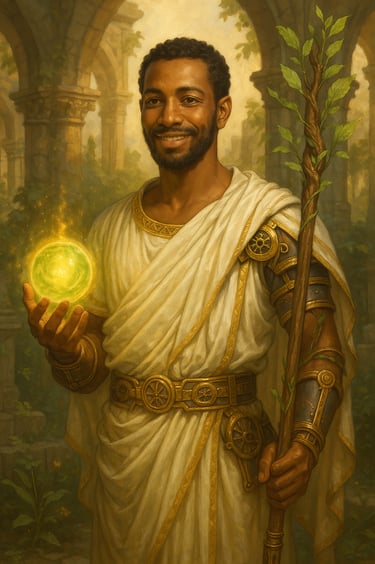

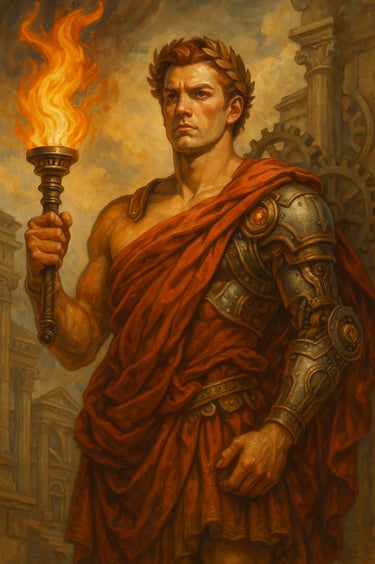

Fuilan is the god of breathless laughter, of flushed cheeks and pounding hearts. He is the radiant fire of new love, the drumbeat of festival nights, and the cry of newborn life. Where joy overflows, where bodies meet in union, or where a field bursts with bloom after rain—Fuilan is present.
He is often depicted as a vibrant, broad-shouldered man crowned in flowers and fireflies, his chest bare and glowing with a blooming heart, vines wrapping around his arms like lovers' hands. His voice booms like festival drums, and his smile can stir the blood of even the most stoic priest.
It is said that Fuilan danced the first heartbeat into the world, stamping his feet until the earth pulsed in time. From his rhythm came passion, renewal, and the sacred spark that separates life from stillness. In his myth, Fuilan once fought a war not with blades, but with blooming fields, outpacing a death-god’s plague by bringing joy and renewal to every village he passed.
Fuilan is worshipped in birth rites, weddings, spring festivals, and any moment when life overcomes stillness. His clergy wear bright reds and golds, and often officiate unions, bless crops, or guide the vulnerable toward renewal after grief. His followers include lovers, healers, dancers, and celebrants, and his temples often resound with laughter, song, and the scent of herbs and honeyed wine. His symbol, a blooming heart entwined with twin vines is carved into birthstones, love charms, and fertility offerings.
Prayer to Fuilan, God of Life and Celebration
Fuilan, Heart-Dancer,
Strike the drum that stirs our souls,
Let passion bloom where pain has dwelled, And joy rise where silence slept.
Bless this breath, this bond, this birth,
With fire in our blood and love in our limbs. By your rhythm, we rise.
By your bloom, we are made whole.
Let life sing ever louder.
Infera is the blazing roar at the heart of battle—the relentless fire that consumes, refines, and remakes. As the god of Fire and War, he is both destroyer and purifier, embodying the harsh necessity of conflict and the sacred crucible of trial. He is not cruel, but he is unflinching. To follow Infera is to accept that pain has purpose and that only through fire can weakness be burned away.
Depicted as a towering figure wreathed in smoke and embers, Infera bears a war helm shaped like a roaring flame and wields a jagged blade that glows with molten heat. His eyes burn gold with a heat that sees weakness, and his voice is like a forge bellows loud, rhythmic, and absolute.
He is said to have been born in the first warcry of the world, formed of molten fury from Thalorion's breath. In his earliest myth, Infera descended into the heart of the world to battle the Stonebound Wyrm, a primordial beast of stagnation. He emerged victorious, though scorched and scarred, and from his wounds fell the first Infernite Stonesembers of divine wrath, now wielded by mortals in battle.
Infera is worshipped by soldiers, smiths, champions, revolutionaries, and those who believe in the strength of trial. His temples are forged of black iron and red stone, often located near volcanoes, arenas, or old battlegrounds. His priests bear burn scars with pride and act as arbiters in matters of honor, vengeance, and strength.
His symbol is a burning sword wrapped in flame, carved into war banners, weapons, and the armor of those who fight in his name.
Prayer to Infera, God of Fire and War
Infera, Flame-Father,
Strike me, and let weakness burn away.
Forge my will in ash and blood,
And sharpen me into something worthy.
Let no fear bind my hand,
Let no lie shield my foes.
By fire, I rise reborn.
By war, I become true.
Burn in me, and I shall not break.
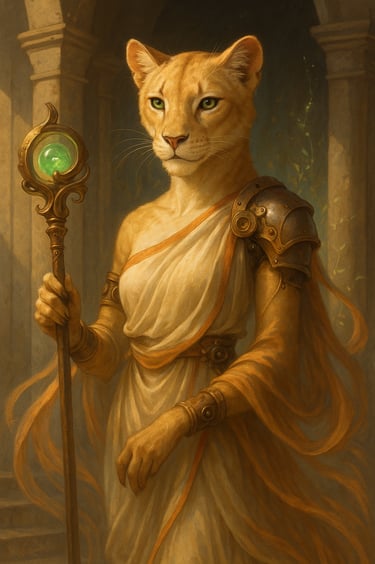

Nadeia is the fierce breath of the wild—guardian of untamed lands, predator and protector in equal measure. As goddess of Nature and Wild Growth, she embodies the raw vitality of the living world, where survival is sacred and balance is kept not by law, but by instinct.
She appears as a towering Leonin woman, her golden mane braided with vines and flowers, her eyes sharp as dusklight through leaves. Her fur bears the colors of moss and earth, and her claws gleam like polished amber. In one hand she carries a carved staff grown from the heartwood of the first forest; in the other, nothing—for her open hand may offer mercy, or strike like a predator.
Nadeia is not a gentle gardener. She is the storm that culls the rot, the fang that keeps the herd strong, and the vine that cracks stone. Her love is fierce, and her rage is justice. In legend, she once tore down an empire that dammed her rivers and hunted her beasts to extinction. When it fell, its ruins became a sacred grove, where animals now nest among marble and moss.
Her followers include beast-tamers, forest wardens, wild druids, and those who walk barefoot beneath sun and moon. Her shrines are living things—trees grown in spiral paths, dens hidden in cliffs, sacred glades where predators and prey drink side by side.
Her symbol is a pawprint overlaid with thorned vines, carved into stone with claw or horn.
Prayer to Nadeia, Greenmane of the Wild
Nadeia, Huntress of Root and Fang,
May our steps fall soft upon your soil,
May our breath be known to leaf and beast.
Give us the strength to protect,
And the wildness to endure.
Let no chain hold the wild heart,
Let no cruelty pass unchallenged.
By tooth, by root, by thunder and bloom
We stand with you.
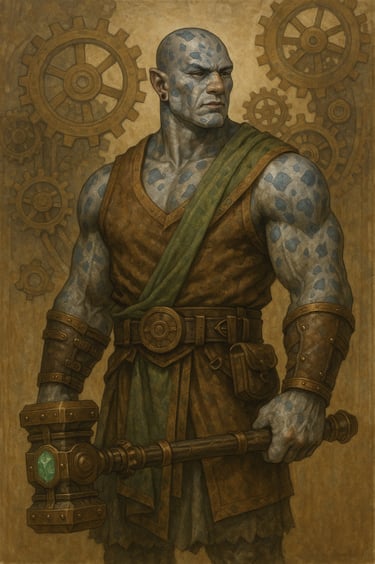

Terragos is the unmoving heart beneath the mountain—the eternal witness to time, trial, and triumph. As the god of Earth and Stability, he represents unyielding strength, patience, and the protection of all things that endure. He is the mountain unmoved by storm, the stone that bears weight without complaint, the voice of ancient truths carved in stone.
Depicted as a broad, weathered man with skin like carved granite and eyes like molten iron, Terragos is a figure of quiet authority. Moss and lichen cling to his shoulders, and veins of gold and quartz run through his arms like lifeblood. His voice is low, slow, and resounding—a god who speaks only when it matters, and when he does, the world listens.
In myth, it was Terragos who first shaped the bones of Caelithar, raising the mountains from the sea at Thalorion’s word. He dug the first caverns for the sleeping titans and laid the foundation stones of civilization. When mortals forget their path, it is Terragos who sends the quake—not to punish, but to remind.
His followers include builders, guardians, smiths, historians, and oathkeepers. His temples are built deep into mountains or carved into canyon walls, marked by solemn halls and echoing chambers of stone. His symbol—a square-cut stone split by a single enduring root—is etched into hammers, shields, and keystones.
Prayer to Terragos, God of Endurance
Terragos, Stonefather,
Hold us steady when all else shifts,
Make our hearts like granite,
And our words as lasting as carved truth.
When we falter, be our footing,
When we fall, be our foundation.
Let time pass, but not erode us,
And let our lives leave marks worth bearing.
By your strength, we endure.
